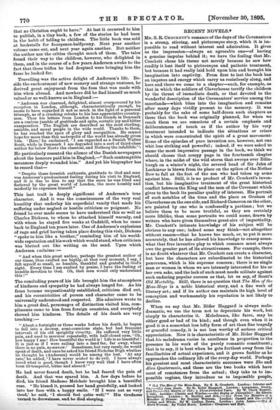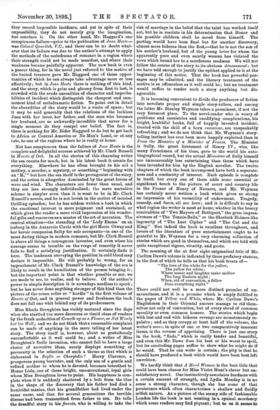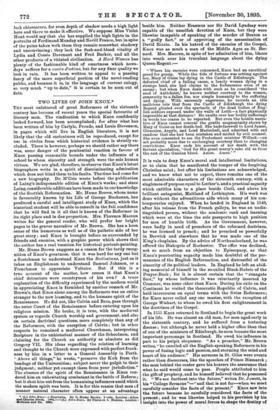RECENT NOVELS.*
MR. S. R. CROCKETT'S romance of the days of the Covenanters is a strong, stirring, and picturesque story, which it is im- possible to read without interest and admiration. It gives us the impression—always an agreeable one—of having a genuine impulse behind it; we have the feeling that Mr. Crockett chose his theme not merely because he saw how readily it lent itself to picturesque and pathetic treatment, but because it had really laid hold upon him and brought his imagination into captivity. From first to last the book has an impetus and energy which carry us resistlessly along, and here and there we come to a chapter—such, for example, as that in which the soldiers of Claverhouse terrify the children by the threat of immediate death, or that devoted to the wonderful description of the Covenanters' service among the moorlands—which bites into the imagination and remains after many days vividly present to the memory. It was probably for the sake of some half-dozen such chapters as these that the book was originally planned, for when we reach them we are conscious of a certain emphasis and deliberateness of touch as if the author by his very treatment intended to indicate the situations or crises in which were concentrated the spirit of a great movement. Some of the episodes of pure invention are, however, not one whit less striking and powerful ; indeed, if we were asked to name the most impressive passage in the book, we think we should choose that creepy page in the fourteenth chapter where, in the midst of the wild storm that sweeps over Edin- burgh on a winter's night, the severed head of Sir John of Lochinvar is blown from its place on the spikes of the Nether Bow to fall at the feet of the son who had taken up arms against him. Still, it is no product of Mr. Crockett's inven- tion, but his imaginative treatment of the great historical conflict between the King and the men of the Covenant which gives to the book its peculiar quality of interest. His portrait of such notables of the time and the place as Graham of Claverhouse on the one side, and Richard Cameron on the other, are painted by one who is confessedly a partisan ; but we believe them to be more truthful, as they are certainly more lifelike, than some portraits we could name, drawn by writers who have given themselves great airs of impartiality. Mr. Crockett's intimate knowledge of his subject will be obvious to any one; indeed some may think—not altogether without reason—that he knows too much, or, to put it more accurately, that he has allowed his knowledge to cramp some- what that free inventive play to which romance must always owe the greater part of its attractiveness. For example, there is no doubt whatever that Mr. Crockett can create a character, but here the characters are subordinated to the historical panorama, which is his supreme concern ; there is no single man or woman in whom we are intensely interested for his or her own sake, and the lack of such must needs militate against such enduring popular success as that, let us say, of Scott's Old Mortality. Still, there is no question that The Men of the Moss-Hags is a noble historical story, and a fine work of literary art ; and if its author can maintain its high level of conception and workmanship his reputation is not likely to decline.
When we say that Mr. Rider Haggard is always melo- dramatic, we use the term not to depreciate his work, but simply to characterise it. Melodrama, like farce, may be either good or bad of its kind ; and though even when it is good it is a somewhat less lofty form of art than fine tragedy or graceful comedy, it is not less worthy of serious critical appreciation. Now it is characteristic of Mr. Rider Haggard that his melodrama varies in excellence in proportion to the presence in his work of the purely romantic constituent ; that is to say, it is best when he gets furthest away from the familiarities of actual experience, and it grows feebler as he approaches the ordinary life of the every-day world. Perhaps his greatest and most characteristic successes were She and Alan Quatermain, and these are the two books which have most of remoteness from the actual ; they take us to im- possible regions, they introduce us to impossible people,
* (1.) The Men of the MoesMage. By S. B. Crockett. London: Isbister and Co.—(2.) Joan Haste. By H. Rider Haggard. London : Lougmans, Green, and Ca.—(3.) Hearts of Oak : a Three-Stranded Yarn. By W. Clark Russell. 3 vols. London: Chatto and Windus.—(4.) Scylla or Charybdis By Rhoda Broughton. London : R. Bentley and Son.—(5.) Prom the Memoirs of a Minister of Prunes. By Stanley Weymau. London: Cassell and Co.—(6.) Ye/low and White. By W. Carlton Dame. London : ohn Lane.—(7.) A Hard Woman. By Violet Hunt. London: Chapman and Mal.
they record impossible incidents, and yet in spite of their impossibility, they do not merely grip the imagination, but convince it. On the other hand, Mr. Haggard's one conspicuous failure—prior to the publication of Joan Haste— was Colonel Quaritch, V.C., and there can be no doubt what- ever that its failure was due to the author's attempt to apply the methods of the melodrama of romance in a region where their strength could not be made manifest, and where their weakness became painfully apparent. The new book is even a poorer thing, for in the novel just referred to the motive of the buried treasure gave Mr. Haggard one of those oppor- tunities of which he can always take advantage more or less effectively ; but in Joan Haste there is nothing of this kind, and the story, which is grim and gloomy from first to last, is crowded with the crude unrealities of character and improba- bilities of incident which distinguish the cheapest and com- monest kind of melodramatic fiction. To point out in detail the absurdities of the story would be a waste of space ; but it may be said generally that the relations of the luckless Joan with her lover, her father, and the man who becomes her husband, are so awkwardly incredible that never for a single moment do they compel our belief. The fact is, there is nothing for Mr. Rider Haggard to do but to get back to Africa or Central America or No Man's Land, or at any rate, to one of the regions where he is really at home.
Not less conspicuous than the failure of Joan Haste is the complete and delightful success achieved by Mr. Clark Russell in Hearts of Oak. In all the stories of this charming writer the sea counts for much, but in his latest book it counts for everything. Elsewhere he has often brought to his aid a mutiny, a murder, a mystery, or something "beginning with an M," but here the sea itself is the protagonist of the story, and the action is altogether dominated by the great forces of wave and wind. The characters are fewer than usual, and they are less strongly individualised; the mere narrative scheme is simpler even than it is wont to be in Mr. Clark Russell's novels, and he is not lavish in the matter of isolated thrilling episodes; but he has seldom written a book in which the emotional interest is more poignant and sustained, or which gives the reader a more vivid impression of his wonder- ful gifts and resources as a master of the art of narration. The central situation—the stranding of the Lady Emma' on an iceberg in the Antarctic Circle with the girl Marie Otway and her heroic companion Selby for sole occupants—is one of the most daring things in modern romance, but Mr. Clark Russell is above all things a courageous inventor, and even when his courage seems to tremble on the verge of temerity it never fails to find a satisfying justification. It certainly finds it here. The landsman surveying the position in cold blood may declare it impossible. He will probably be wrong, for an impeachment of Mr. Clark Russell's knowledge of the sea is likely to result in the humiliation of the person bringing it ; but the important point is that whether possible or not, we are made to see, to realise, and to believe. Of the author's power in simple description it is nowadays needless to speak ; but he has never done anything stronger of this kind than the picture of the ocean roller or " hurdle " in the first volume of Hearts of Oak, and in general power and freshness the book does not fall one whit behind any of its predecessors.
Miss Rhoda Broughton has visibly matured since the days when she startled tee more decorous or timid class of readers by the frank audacities of Cometh up as a Flower, or 1Vot Wisely but too Well; and we do not think that a reasonable complaint can be made of anything in the mere telling of her latest story. The story itself is, however, about as gratuitously uncomfortable as it well could be ; and a writer of Miss Broughton's facile invention, who cannot fail to have a large choice of narrative ideas, surely displays something of perversity in the selection of such a theme as that which is elaborated in Scylla or Charybdis? Harry Clarence, a prosperous young barrister, and the only son of a gentle and refined mother to whom he is devoted, becomes betrothed to Honor Lisle, one of those bright, unconventional, loyal girls whom Miss Broughton loves to paint. His happiness is com- plete when it is suddenly shattered by a bolt from the blue in the shape of the discovery that his father had died a homicidal maniac, that his grandfather had lived under the same curse, and that for several generations the terrible disease had been transmitted from father to son. He tells the dreadful story to his fiancée, who is willing to take the risk of marriage in the belief that the taint has worked itself out, but he is resolute in his determination that Honor and his possible children shall be saved from himself. The parting would have been final but for another discovery, almost more hideous than the first,—that he is not the son of his mother's husband, but of the young lover for whom the apparently pure and even saintly woman has violated the vows which bound her to a murderous madman We will not follow the course of the story to its obvious dinouement ; but we have told enough to justify the epithet applied to it at the beginning of this notice. That the book has powerful pas- sages may be admitted, and the literary treatment of the motive is as offenceless as it well could be; but no treatment would suffice to render such a story anything but dis- agreeable.
It is becoming convenient to divide the producers of fiction into novelists proper and simple story-tellers, and among the latter Mr. Stanley Weyman takes a prominent, if not the very foremost place. To the novel-reader who is weary of problems and casuistries and unedifying complications, his bright, healthful books, full of happily invented incident. treated with the skill of a born raconteur, are unspeakably refreshing ; and we do not think that Mr. Weyman's story- telling instinct has ever been more happily exploited than in Front the Memoirs of a Minister of France. The Minister is Sully, the great lieutenant of Henry IV., who, like many Frenchmen of his time, gave to the world his auto- biographical record, but the actual Memoires of Sally himself are immeasurably less entertaining than those which have been invented for him by the English novelist. The twelve chapters of which the book is composed have both a separate- ness and a continuity of interest. Each episode is complete in itself, but every one of them adds some essential or significant touch to the picture of court and country life in the France of Henry of Navarre, and Mr. Weyman has certainly never written a book which gives so strong an impression of his versatility of endowment. Tragedy, comedy, and farce, all are here ; and it is difficult to say in what region the writer is most at home, whether in the breezy comicalities of "Two Mayors of Bottiport," the grim impres- siveness of "The Tennis-Balls," or the Sherlock Holmes-like ingenuity of "The Lost Cipher" and "The Cat and the King." But indeed the book is excellent throughout, and lovers of the literature of pure entertainment ought to be grateful to Mr. Weyman for a very charming collection of stories which are good in themselves, and which are told with quite exceptional vigour, vivacity, and gusto.
The meaning of the at first sight enigmatical title of Mr.
Carlton Dawe's volume is indicated by three prefatory stanzas, in the first of which he tells us that his book treats of-
" The love of the white for the yellow,
The yellow for white ;
Where music and laughter make mellow
The long Eastern night ; When, rid of convention, a fellow Does everything right."
There could not well be a more distinct promise of un- savouriness, and it is a promise which is amply fulfilled in the pages of Yellow and White, where Mr. Carlton Dawe's Englishmen in their Oriental amours manage to rid them- selves not only of convention, but of every shred of common
morality or even common honour. The stories which begin with lust and end with hideous revenge are monotonously re-
pulsive; and as they occupy at least half of the volume, the writer's menu, in spite of one or two comparatively innocent items, is the reverse of appetising. There is just one story in the book, " Sada," which is really tender and beautiful, and even this Mr. Dawe does his best or his worst to spoil, but its concluding pages suffice to show what he might do if he would. That he can write is certain ; the pity is that he should have produced a book which would have been best left unwritten.
We hardly think that A Hard Woman is the best title that could have been chosen for Miss Violet Hunt's clever but un-
satisfactory novel. One instinctively associates hardness with a certain amount of strength, and Lydia Munday is in no
sense a strong character, though she has some of that persistence which often characterises a shallow and fluidly selfish nature. As a picture of the seamy side of fashionable London life the book is not wanting in a cynical mordancy which some readers may find piquant; but to no it seems to Jack chiaroscuro, for even depth of shadow needs a high light here and there to make it effective. We suppose Miss Violet Hunt would say that she has supplied the high lights in the portraits of Ferdinand Munday and Nevi11 France, but in spite of the pains taken with them they remain somewhat shadowy and unconvincing ; they lack the flesh-and-blood vitality of Lydia and Cossie Davenant and Fred Barker, and all the other products of a vitiated civilisation. A Hard Woman has plenty of the fashionable kind of smartness which nowa- days suffices for a SUCCeS d'estime, but for any finer quality we look in vain. It has been written to appeal to a passing fancy of the more superficial portion of the novel-reading public, and because it is, in the language of current eulogy, so very much "up to date," it is certain to be soon out of date.












































 Previous page
Previous page